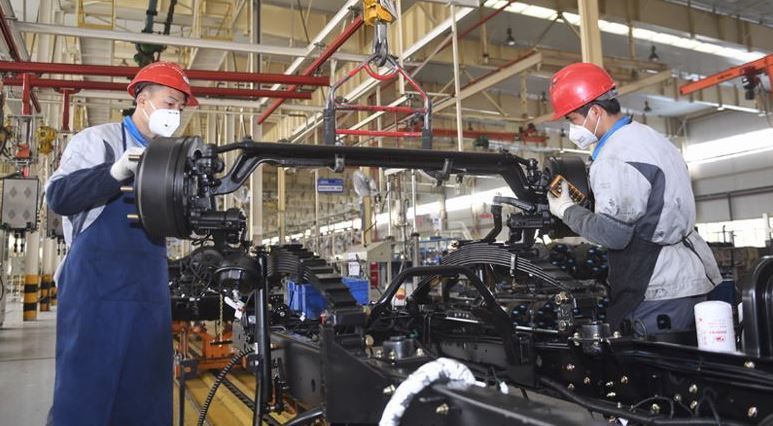
Editor's note: Wu Jinduo is head of fixed income at the research institute of Great Wall Securities and a part-time fellow of the Development Research Institute at Fudan University. The article reflects the author's opinions, and not necessarily the views of CGTN.
The COVID-19 outbreak has pressed the pause button for China's social life and economic output. During the Spring Festival, Chinese residents spent a long time quarantining themselves at home. This resulted in a sharp reduction in domestic and foreign travel, bringing a freeze on consumption.
Just as global manufacturers have worried, China's influence in the global economy, trade and supply chain is too big to be ignored. According to data from the United Nations statistics division, China's contribution to world economic growth in 2018 was 33.43 percent. China is the largest trading country, the world's second largest economy, the second largest consumer country and the second largest manufacturing country in the world. It is also the country with the largest number of Fortune 500 enterprises, the world's largest logistics market and the world's largest e-commerce market. China's contribution to the world in terms of total amount, as well as its international labor division and embeddedness in the global supply chain, cannot be ignored.
There is no doubt that the supply chain has become an indispensable business infrastructure in the world. China has strong competitiveness in logistics and supply chain. But, due to COVID-19 and seasonality, China's supply chain and logistics system are undergoing a tough time.
According to the data from Shanghai Shipping Exchange, the growth rate of export freight volume in December 2019 decreased from 9.5 percent to 6.2 percent. Data from the General Customs Administration shows that China (Shanghai) Seaborne Import composite Index (CSI) declined to 126.61 points in January 2020 from 154.47 points in December 2019.

Workers at the Chengdu Dayun Automobile Group Co. Ltd in southwest China's Sichuan Province, February 17, 2020. /Xinhua
Workers at the Chengdu Dayun Automobile Group Co. Ltd in southwest China's Sichuan Province, February 17, 2020. /Xinhua
Production in China has been delayed in most factories even after the Lantern Festival, which for many businesses marks the end of the Chinese New Year holiday. Wuhan, the city that has been severely affected by COVID-19, is an important industrial city providing auto parts and accessories, as well as auto assembly and processing for global auto dealers. The suspension of production for auto accessories suppliers puts the global auto supply chain system under great pressure. It will take time for China to resume fully normal operation in production and social life. The global manufacturers are worried about the current inventory shortage and are concerned about both the direct and indirect impact of China's supply chain disruption.
In addition, labor shortages may have an impact on China's supply chain. The import and export of processing trade account for 25.2 percent of China's total foreign trade in 2019, and the general trade accounts for 59 percent of China's total trade. Furthermore, China's export commodities are mainly mechanical and electrical products that are labor-intensive. At present, due to the shortage of protection equipment for COVID-19, some manufacturing industries, even in the less affected provinces in China, have many difficulties with recruitment despite offering high wages. Under these circumstances, labor shortages and late work resumption can also impact the supply chain both within China and around the globe.
China's cross-border e-commerce has continued to flourish in recent years. In 2019, import and export through e-commerce platforms reached 186.21 billion yuan, an increase of 38.3 percent, accounting for one third of the total imports and exports quota of market procurement mode. In the well-known selection of global supply chain released by Gartner, a global research and advisory firm, Alibaba was selected for the first time in the top 25 global supply-chain enterprises in 2019. It shows the strength and position of China in the global supply chain.
The impact of COVID-19 may be temporary, but the limit is still unknown, since COVID-19 is spreading all over the world. China's role in the global supply chain system is not easily replaced, and the cost of replacement is very high.
The meeting of China's Politburo on February 21 stressed that the country's priority should be given to ensure the recovery of production and supply of leading enterprises and key links that have an important impact on the global supply chain and maintaining the stability of the global supply chain. In the future, with the refinement of labor division and technological progress, especially the application for big data and artificial intelligence, the supply chain will gradually develop into a cross industry, cross region, cross ecosystem type.
(If you want to contribute and have specific expertise, please contact us at opinions@cgtn.com.)